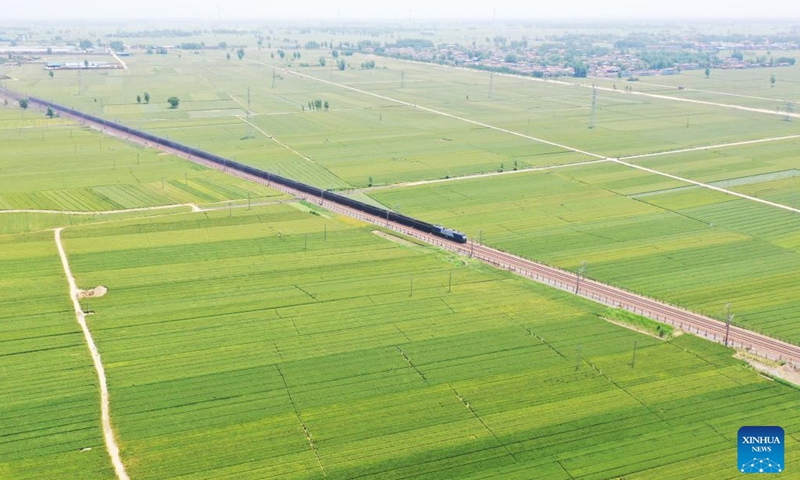
Aerial photo taken on May 17, 2022 shows wheat fields in Lizhuang Village, Senggu Township, Yanjin County of Xinxiang City, central China's Henan Province. In Yanjin County, a group of agricultural experts reached out to local farmers, offering instructions on farmland management, to help them attain a bumper harvest.(Photo: Xinhua)
China's public security authorities on Tuesday vowed to show zero tolerance for illegal acts that harm food and farmland to ensure national food security, with more than 8,800 relevant cases being busted in the past seven months in a special campaign.
As the country's "100-day" campaign continues, the Ministry of Public Security (MPS) said that it will simultaneously deepen one of its campaigns, called "Kunlun", in cracking down on food security related illegal acts.
The MPS vowed that it will further strengthen collaboration among departments to jointly crack down on illegal acts that harm farmland and cut off criminal links.
The MPS mentioned some prominent problems in this field on Tuesday, such as illegally occupying farmland for construction, mining or waste storage, contaminating farmland that has black soil or selling unapproved fertilizers.
In April, the public security authorities in Hengshui, North China's Hebei Province, cracked a case of manufacturing and selling counterfeit and shoddy fertilizers, arresting 31 suspects and seizing more than 300 tons of products on site. It was one of 10 cases revealed by the MPS on Tuesday with the largest number of suspects being caught.
It was found that a suspect surnamed Xu, together with a business manager of a fertilizer company in Hebei's capital city of Shijiazhuang, produced a large amount of compound fertilizer with almost zero phosphorus or potassium content. This was bagged and labeled, using counterfeit famous brands of fertilizers or creating their own brands for low-priced sales. Preliminary investigation involved some 18,000 tons of products, with the case value reaching more than 30 million yuan ($4.4 million.)
Another case revealed that two suspects were detained in South China's Hainan Province in January for illegally using arable land for the construction of tourism and restaurant facilities between 2009 and 2020. Their behavior damaged some 60 mu of farmland.
According to the Ministry of Natural Resources,
China will expedite the formulation of a farmland protection law, a further step to safeguard the country's farmlands, Xinhua News Agency reported in June.
Existing regulations, such as the prohibited non-agricultural use of arable land, will be elevated to law, the ministry said.
China always adheres to the strictest farmland protection system, striving to ensure its farmland acreage remains above the redline of 120 million hectares.
In 2022, the country will develop 6.67 million hectares of high-standard farmland, promote national projects on black soil protection, and launch the third nationwide soil condition census, according to the No. 1 Central Document released in February, Xinhua said.
Global Times

